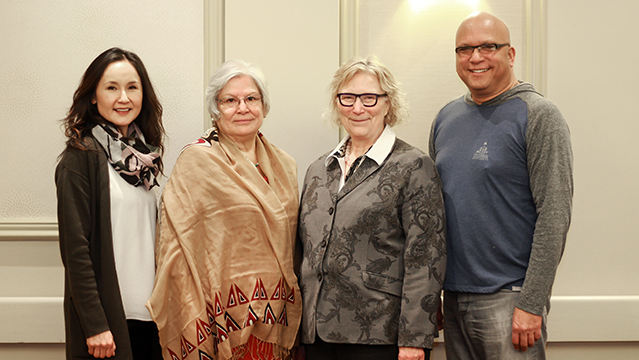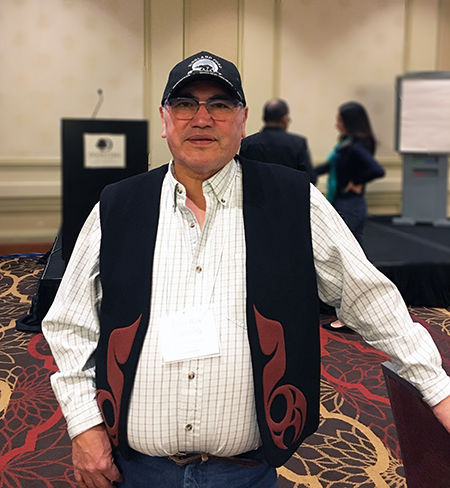
From left to right: Tibetha Kemble, Elder Marilyn Buffalo, Jill Konkin and Barry Lavallee.
First Nations Elders, community members and the University of Alberta Faculty of Medicine & Dentistry (FoMD) came together to initiate a conversation about the creation of a shared vision for the future of Indigenous health.
The Community Gathering took place on February 20 and 21 in Edmonton. Through various speakers, presentations, break-out sessions involving a broad range of partners in Indigenous Health, participants discussed topics like Indigenous health outcomes, the implementation of the Truth and Reconciliation Commission of Canada (TRC) Calls to Action, and Indigenous student admissions, recruitment and professional development.
The encounter, attended by numerous Indigenous community members and organizations, is a first step towards ongoing collaborative work by the U of A's Indigenous Health Initiatives Program in the Division of Community Engagement.
"The landscape shifted when the TRC Calls to Action came out in 2015," said Tibetha Kemble, Director of Indigenous Health in the FoMD. "Our Indigenous Health Program strategic plan identified the need to come together, do things differently and to place an emphasis on community voice in our work. This was one of the ways in which we thought of bringing community and faculty together, to at least begin the conversation around Indigenous health."
"I think we had more community people there than faculty, which is exactly what we wanted it to be," said Kemble. "I'm so proud that so many people came out, and were interested and willing to have this important initial conversation."
Looking to close gaps in Indigenous health
"Indigenous students beat the odds of suicide, alcoholism and more. Like when turtles are born and race to the ocean with predators around and only a few make it. Those students on campus are like the turtles that made it through." -Elder Rick Lightning, Maskwacîs
A federal report released in 2018 indicates that despite new funding and initiatives to support improved health outcomes, Indigenous peoples now have a 15-year shorter life expectancy than non-Indigenous peoples-nearly two times the gap reported 20 years ago, when life expectancy of Indigenous peoples was seven to eight years shorter than the rest of the population.
Some of the most frequent health issues affecting Indigenous communities are high infant mortality rates, mental health problems and chronic diseases such as diabetes or kidney disease.
"I would like to hear more about exclusionary politics within the systems," said Brad Cardinal, Executive Director at Poundmaker's Lodge-an Indigenous centre for the treatment of addictions and mental health-who attended the Gathering. "Coming from an Aboriginal organization, we deal with this on a daily basis."
For Elder Rick Lightning, who is from Maskwacîs, it is important for non-Indigenous people to learn about the misconceptions of how communities are funded to address their health problems.
"We're given $50,000 to work with suicide. It costs $10,000 to bury one child. We're already looking at 14 people who committed suicide since December 24 and we're supposed to try to fight the suicide epidemic in our communities," said Lightning.

Elder Rick Lightning
He praised Indigenous university students as survivors from the difficult conditions. "They beat the odds of suicide, alcoholism and more. Like when turtles are born and race to the ocean with predators around and only a few make it. Those students on campus are like the turtles that made it through."
Building relationships for a truly shared vision of health
For attendees, one of the highlights of the event was keynote speaker Barry Lavallee, physician and Director of Education at the University of Manitoba's Indigenous Institute for Health & Healing. His straightforward talk shed light on the impact of colonialism on Indigenous health outcomes and Indigenous experiences with the health-care system, which sometimes lacks cultural safety for these communities.
Lavallee also brought up the need for Indigenous communities to be allowed in the decision process about their living conditions and their future.
Lightning agrees, "We talk about partnerships, like two equal partners coming together to work on a common goal. When we come together and it's only about their thoughts and processes, is it really a partnership? Whose goal are we really working towards?"
Jill Konkin, Associate Dean, Division of Community Engagement, acknowledges the need for a better dialogue and advocates for closer bonds with communities. "This was the very beginning of a more intentional conversation. There's a much bigger cultural change that needs to happen. We're still on baby steps to having Indigenous people and voices at the tables where we make our decisions. "
"This isn't just input from Indigenous communities, it's working with them to determine where we're going to go together. Before calling them 'partnerships,' we have to build the relationship."
"We really needed to have these conversations. I think so many of us recognize that this is just the beginning," added Kemble. "We need to say to communities, 'How can I meet your health-care needs from your perspective?' It's not just about ensuring Indigenous people have access to care, but ensuring that once they get to that care it doesn't diminish, but rather strengthens who they are."
Kemble and Konkin foresee more Gatherings in the future and mechanisms to increase the faculty's accountability on Indigenous health, which will be determined by their work with community members.
"My deepest gratitude is with the Elders and community members for sharing their wisdom which, among other things, emphasized that we move from 'listening' to really hearing what Indigenous peoples are telling us. I also thank Dr. Dennis Kunimoto (Acting Dean, FoMD) and Dr. Shirley Schipper (Vice-Dean, Education, FoMD) for supporting this important work and helping to make this possible."
Indigenous communities punctuate the importance for other groups to be willing to know them better.
"Come sit with us at a ceremony, understand our language, our customs, our spirituality,' said Cardinal. "Continue engaging with us on a regular basis, I think we can create meaningful relationships that way."
"I wish that everybody could come to the reserves and find out who we are, experience our community," said Lightning. "The door is open. We need people to know that we're humans."